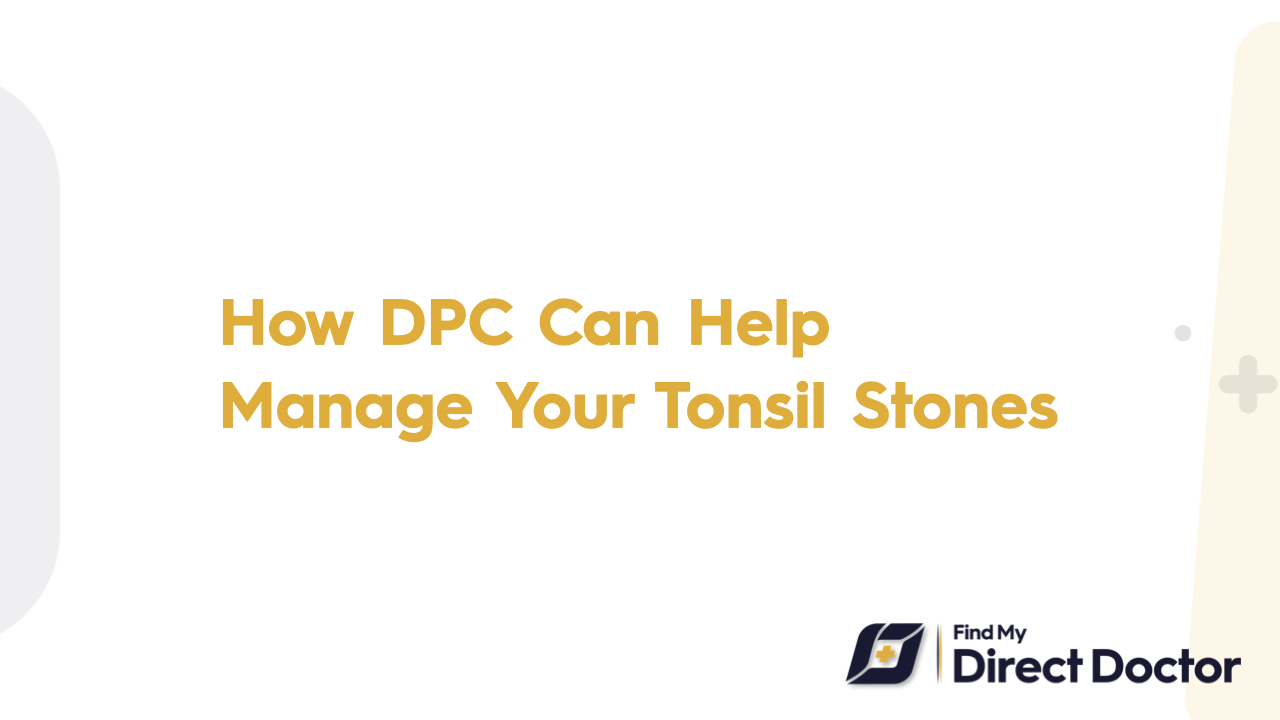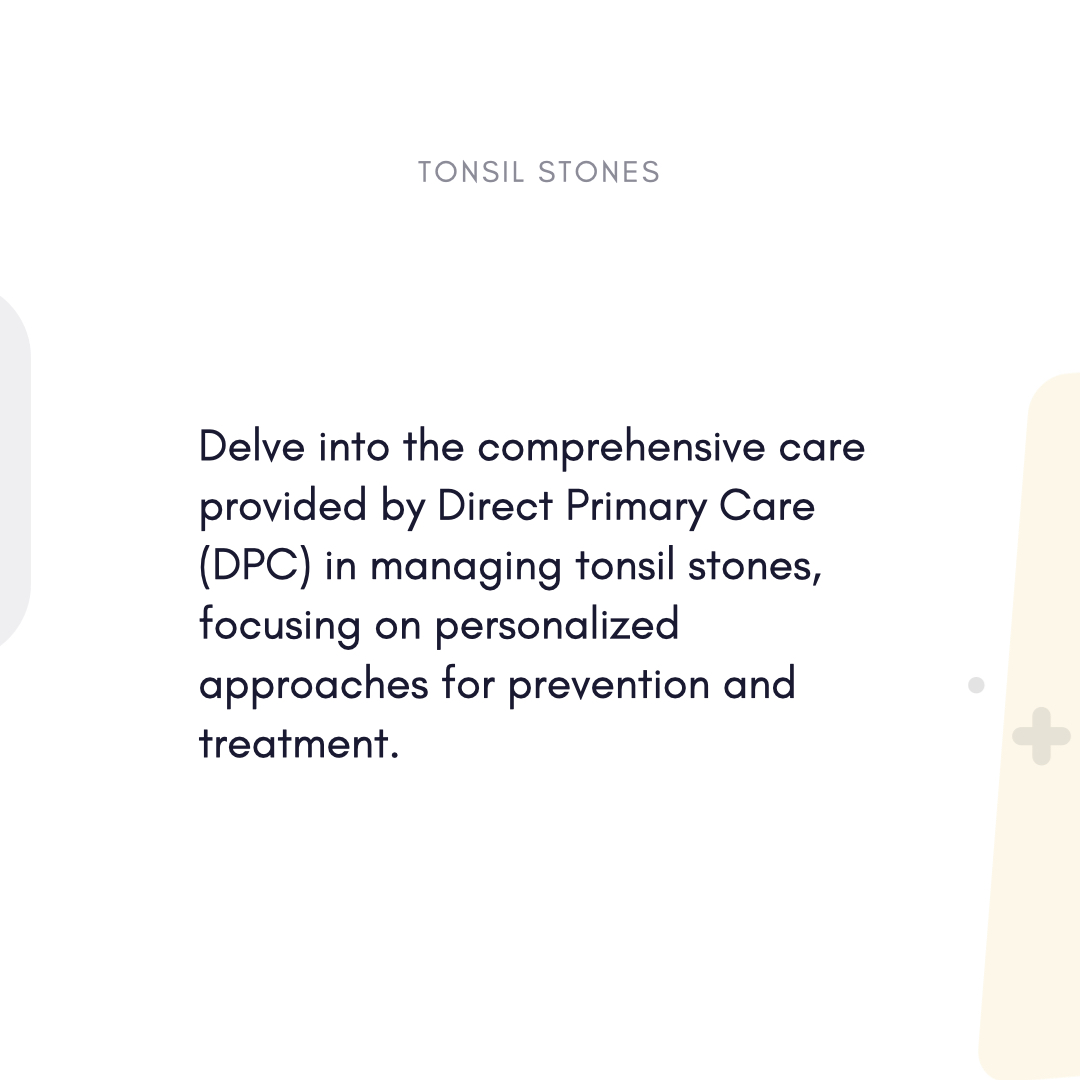Tonsil Stones and Direct Primary Care (DPC): Fresh Breath, Personalized Solutions
You know the trouble of tonsils if you have ever coughed up a foul-smelling white lump from your throat or suffered persistent bad breath even after brushing. One in ten adults experience discomfort and social anxiety from these calcified garbage clusters. Direct Primary Care (DPC), which combines fast relief, cost transparency, and techniques to prevent recurrence, offers a proactive, patient-first approach to tonsil stone management, though.

Appreciating Tonsil Stones and Their Effects
Debris (food, dead cells) calcifies in tonsil crypts to form tonsil stones. Important manifestations:
- Halitosis, continual bad breath.
- Sore throat or cough: From inflammation.
- On tonsils, obvious white or yellow patches.
Chronic cases result in:
- Repeated throat infections.
- Social disengagement from breath issues.
- Tonsil hypertrophy and problems swallowing.
DPC Changes Things Tonsil Stone Care
Under the membership model known as Direct Primary Care (DPC), patients pay a monthly fee—usually 50 USD–150 USD—for unlimited access to their main care physician. For those with tonsil stones, this means no surprise bills, no waiting weeks for ENT visits, and treatment concentrated on clearing crypts and rebuilding confidence.
DPC distinguishes itself for the following:
1. On-time, in-office treatment
DPC doctors follow AAO-HNS policies including:
- Manual removal: On visits, use sterile tools to remove stones.
- Irrigation: Flushing crypts with saline rinses.
- Referrals for laser cryptolysis: negotiated at cash rates for returning patients.
2. Reasonably priced preventive tactics
- By offering reasonably priced oral hygiene kits—water flossers, tongue scrapers—DPC clinics help to lower costs.
- Providing probiotic lozenges to equilibrium the oral flora.
- Avoiding ER trips for sore throats under same-day treatment.
3. Support and Ongoing Learning
- Having 24/7 access to your DPC doctor will allow you to learn appropriate gargling techniques—such as apple cider vinegar or saltwater.
- Change diets to cut dairy or sugar intake that fuels bacteria.
- With counseling tools, address halitosis-related anxiety.
DPC Benefits for Tonsil Stone Patients: Customized Care Plans
- During each visit, DPC doctors dedicate 30 to 60 minutes developing plans including:
- Individualized irrigation plans: home flushings with curved syringes.
- Dietary changes: anti-inflammatory, low-mucus foods.
- Managing allergies means lowering post-nasal drip that feeds garbage.
Financial Reductions
- There are no co-pays for regular stone removal.
- Referrals for tonsillectomy at 3,000 USD rather than 10,000 USD plus with insurance.
- Avoidance of expensive breath clinics by in-office treatment.
Generalized Oral Health
DPC solves root causes by means of:
- Oral microbiome testing: spotting bacterial anomalies.
- Working with dentists for tartar control helps with dental coordination.
- Advice on hydration: Increasing water intake will help to flush trash.
Stories of Real-Life Success
- Case 1: Sarah, 28, used probiotics and her DPC-recommended oral hygiene routine to cut stone recurrence by 80%.
- Case 2: With in-office laser cryptolysis set up by his DPC clinic, Mike, 35, avoided 5,000 USD in ENT costs.
FAQs: Tonsil Stones and DPC
- Q: Can major health problems be brought on by tonsils stones?
- A: Though rare, chronic cases can cause tonsillitis. DPC watches for red flags.
- Q: Is DPC reasonably cost for regular stone removal?
- A: Agreed. Comparatively to urgent care, members save 50–70% on removal visits.
- Q: If I require a tonsillectomy, what then?
- A: A DPC arranges pre-operative care and cash-pay discounts with surgeons.
Why DPC Offers Tonsil Stone Patients a Win
The American Academy of Otolaryngology emphasizes prevention mostly dependent on patient education. DPC presents this by:
- Early Stone catching: stop crypt expansion.
- Teaching self-removal and hygiene helps empower patients.
- Simplifying care: One monthly cost pays for unlimited support and consultations.
DPC helps you to breathe easy.
Tonsil stones do not have to rule your life. Every flush, every check-up, every confident smile—you get a partner who listens, acts quickly, and stresses your comfort with DPC.






